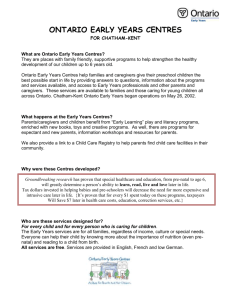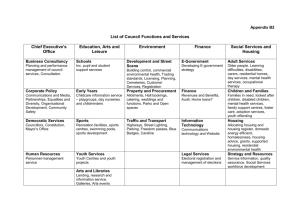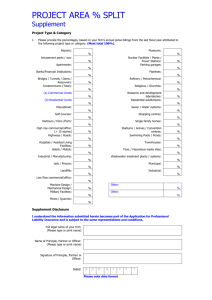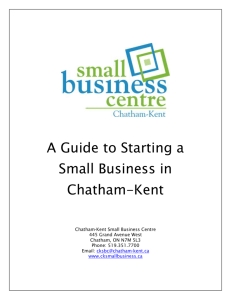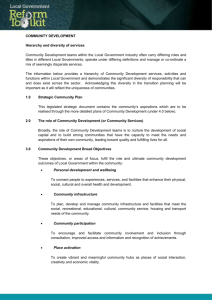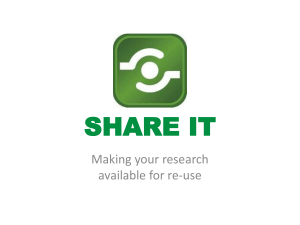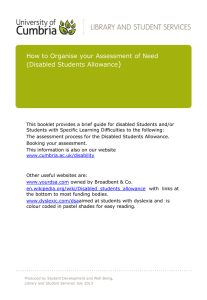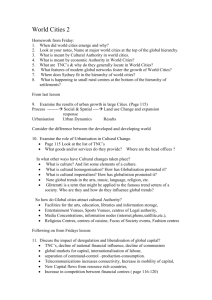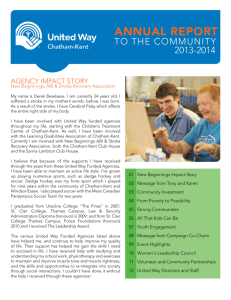Accessible Customer Service Policy - Chatham
advertisement
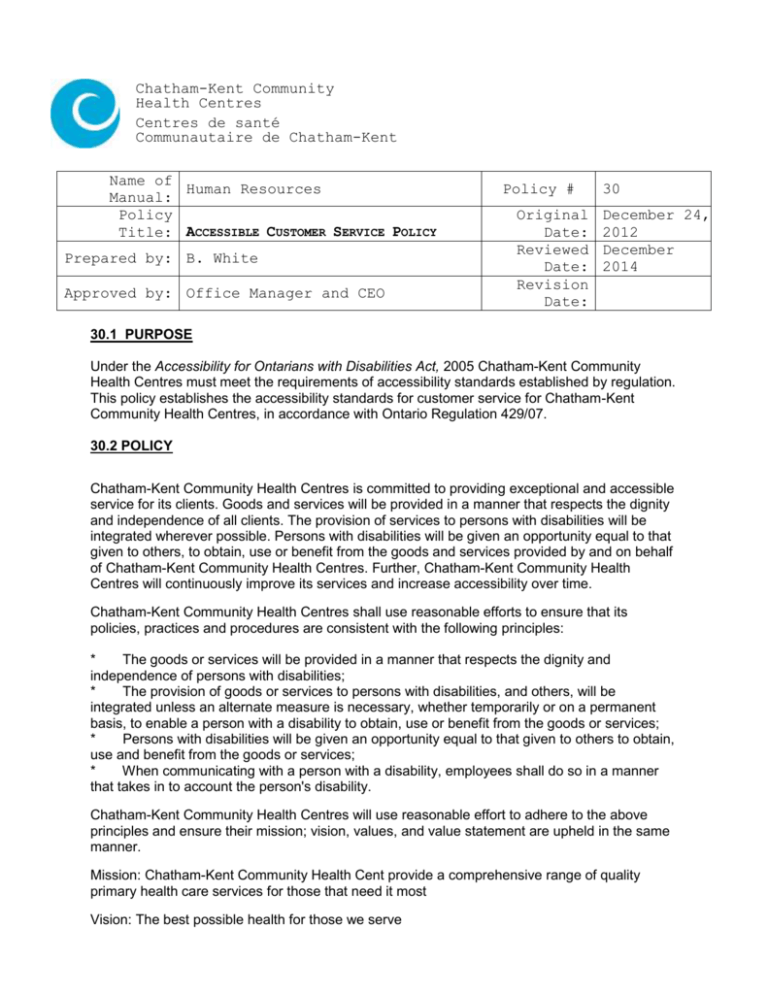
Chatham-Kent Community Health Centres Centres de santé Communautaire de Chatham-Kent Name of Human Resources Manual: Policy Title: ACCESSIBLE CUSTOMER SERVICE POLICY Prepared by: B. White Approved by: Office Manager and CEO Policy # Original Date: Reviewed Date: Revision Date: 30 December 24, 2012 December 2014 30.1 PURPOSE Under the Accessibility for Ontarians with Disabilities Act, 2005 Chatham-Kent Community Health Centres must meet the requirements of accessibility standards established by regulation. This policy establishes the accessibility standards for customer service for Chatham-Kent Community Health Centres, in accordance with Ontario Regulation 429/07. 30.2 POLICY Chatham-Kent Community Health Centres is committed to providing exceptional and accessible service for its clients. Goods and services will be provided in a manner that respects the dignity and independence of all clients. The provision of services to persons with disabilities will be integrated wherever possible. Persons with disabilities will be given an opportunity equal to that given to others, to obtain, use or benefit from the goods and services provided by and on behalf of Chatham-Kent Community Health Centres. Further, Chatham-Kent Community Health Centres will continuously improve its services and increase accessibility over time. Chatham-Kent Community Health Centres shall use reasonable efforts to ensure that its policies, practices and procedures are consistent with the following principles: * The goods or services will be provided in a manner that respects the dignity and independence of persons with disabilities; * The provision of goods or services to persons with disabilities, and others, will be integrated unless an alternate measure is necessary, whether temporarily or on a permanent basis, to enable a person with a disability to obtain, use or benefit from the goods or services; * Persons with disabilities will be given an opportunity equal to that given to others to obtain, use and benefit from the goods or services; * When communicating with a person with a disability, employees shall do so in a manner that takes in to account the person's disability. Chatham-Kent Community Health Centres will use reasonable effort to adhere to the above principles and ensure their mission; vision, values, and value statement are upheld in the same manner. Mission: Chatham-Kent Community Health Cent provide a comprehensive range of quality primary health care services for those that need it most Vision: The best possible health for those we serve Values: At the Chatham-Kent Community Health Centres we believe that values are important and culture counts. We will strive to use these values in all that we do: Client-centered Equity Respect Accessibility Shared care Value Statement: The Chatham-Kent Community Health Centres are committed to providing high quality health care equally to all people that is readily accessible when they need it. We believe all people deserve to be treated with respect in a place that is client centres, which shares the responsibility of care with the individual, appropriate interdisciplinary team members and community partners. Chatham-Kent Community Health Centres care for individuals who are in need of primary care and people who experience challenges in getting the health care they need. Chatham-Kent Community Health Centres work with other health professionals and community agencies – including schools, social services, and many others, who share a common commitment to the health of people. Chatham-Kent Community Health Centres is committed to providing exceptional and accessible service for its clients by working together and combining the best of our services and resources, and designing services to meet the health and accessibility needs of the community. Furthermore, the staff at Chatham-Kent Community Health Centres will take the time to listen carefully to your concerns, including accessibility requirements, and will work together with you to develop a plan that works for you. DEFINITIONS: Accessible means customer service is provided in a manner that is capable of being easily understood or appreciated; easy to get at; capable of being reached, or entered; obtainable. Assistive Device means any device or mechanism that assists a person with a disability in accessing, and benefiting from the services provided. Assistive devices may include, but are not limited to; ASL interpretation, wheelchair, walker, cane, assistive listening device, visual alarms, or assistive software programs. Disability means: a) Any degree of physical infirmity, malformation or disfigurement that is caused by bodily injury, birth defect or illness and, without limiting the generality of the foregoing, includes diabetes mellitus, epilepsy, a brain injury, any degree of paralysis, amputation, lack of physical co-ordination, blindness or visual impairment, deafness or hearing impediment, muteness or speech impediment, or physical reliance on a guide dog , or other animal or on a wheelchair or other remedial appliance or device, b) A condition of mental impairment or a developmental disability, c) A learning disability, or a dysfunction in one or more of the processes involved in understanding or using symbols or spoken language, d) A mental disorder, e) An injury or disability for which benefits were claimed or received under the insurance plan established under the Workplace Safety and Insurance Act, 1997. Guide Dog means a dog trained as a guide for a blind person and having the qualifications prescribed by the Blind Persons’ Rights Act R.S.O. 1990, c. B.7, s. 1 (1). Service animal is an animal that provides assistance for a person with a disability. It may be readily apparent that the animal is used by the person for reasons relating to his/her disability; or a person may be asked to provide a letter from a physician or nurse confirming that the person requires the animal for reasons relating to the disability 30.3 POCEDURES Use of Service Animals and Support Persons If a person with a disability is accompanied by a guide dog or other service animal, ChathamKent Community Health Centres will ensure that the person is permitted to enter any public facility with the animal and to keep the animal with him or her unless the animal is otherwise excluded by law. Where a service animal is excluded by law, Chatham-Kent Community Health Centres will ensure that other measures are available to enable the person with a disability to obtain, use and benefit from Chatham-Kent Community Health Centres goods and services. Example: If a service animal is not readily apparent as such, employees can ask for a letter from a physician or nurse confirming the purpose of the animal. (See Service animal definition) If a person with a disability is accompanied by a support person, Chatham-Kent Community Health Centres will ensure that both persons are permitted to enter any facility, and that the person with a disability is not prevented from having access to the support person. Assistive Devices Chatham-Kent Community Health Centres is committed to serving people who use assistive devices to obtain, use and benefit from our goods and services. People with disabilities may use their assistive devices in our facilities. Notice of Temporary Disruptions Chatham-Kent Community Health Centres will provide notice of temporary disruptions. The notice will include information about the reason for the disruption, its anticipated duration, and a description of any available, alternative services. Notice will be made conspicuous and may be displayed at the location of the disruption, at public entrances and service counters. Accessibility Training Policy Every person who deals with members of the public or who participates in developing ChathamKent Community Health Centres policies, practices and procedures governing the provision of goods and services to the public; including organization staff, volunteers, agents, contractors and others who provide service on behalf of Chatham-Kent Community Health Centres will receive training regarding the provision of goods and services to persons with disabilities. The training will include the following information i. the purposes of the Accessibility for Ontarians with Disabilities Act, ii. how to interact and communicate with persons with various types of disabilities, iii. how to interact with persons with disabilities who use an assistive device, or require the assistance of a service animal or support person iv. how to use equipment made available by Chatham-Kent Community Health Centres to help people with disabilities to access goods and services v. what to do if a person with a disability is having difficulty accessing Chatham-Kent Community Health Centres goods and services Training will be provided to each person according to his or her needs and duties and as soon as is practicable after he or she is assigned the applicable duties. Training will be provided on an ongoing basis in connection with changes to policies, practices and procedures governing the provision of goods or services to persons with disabilities. A record of the dates on which training is provided and the number of individuals to whom it is provided will be kept. Feedback Process Chatham-Kent Community Health Centres has a feedback process through which people with disabilities can provide information and feedback about the goods and services they receive. Feedback can be received in a variety of ways, in person, by mail, email, telephone, or fax. Notice of availability of documents Chatham-Kent Community Health Centres will provide the public notice of the availability of the documents, required by the Accessibility Standards for Customer Service, (O. Reg 429/07). Notice of availability will be provided on the web site and through other printed methods. Format of documents If Chatham-Kent Community Health Centres is required, by the Accessibility for Ontarians with Disabilities Act, 2005, to give a copy of a document to a person with a disability, Chatham-Kent Community Health Centres will take into account the persons' ability to access the information and will provide the document or information contained in the document in a format that meets those needs as agreed upon with the person.
